实验五
实验任务1.1
实验代码
#include <stdio.h>
#define N 4
int main()
{
int x[N] = {1, 9, 8, 4};
int i;
int *p;
// 方式1:通过数组名和下标遍历输出数组元素
for (i = 0; i < N; ++i)
printf("%d", x[i]);
printf("\n");
// 方式2:通过指针变量遍历输出数组元素 (写法1)
for (p = x; p < x + N; ++p)
printf("%d", *p);
printf("\n");
// 方式2:通过指针变量遍历输出数组元素(写法2)
p = x;
for (i = 0; i < N; ++i)
printf("%d", *(p + i));
printf("\n");
// 方式2:通过指针变量遍历输出数组元素(写法3)
p = x;
for (i = 0; i < N; ++i)
printf("%d", p[i]);
printf("\n");
return 0;
}
实验结论
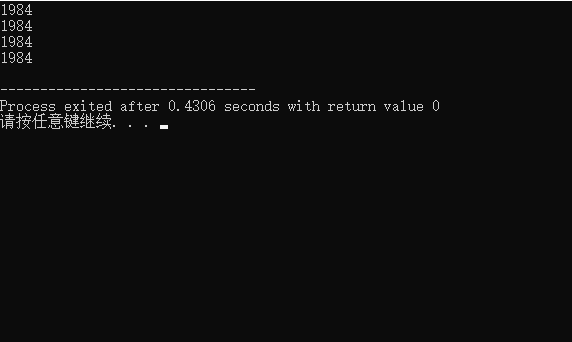
实验任务1.2
实验代码
#include <stdio.h>
int main()
{
int x[2][4] = {{1, 9, 8, 4}, {2, 0, 4, 9}};
int i, j;
int *p;
int(*q)[4];
// 使用数组名、下标访问二维数组元素
for (i = 0; i < 2; ++i)
{
for (j = 0; j < 4; ++j)
printf("%d", x[i][j]);
printf("\n");
}
// 使用指针变量p间接访问二维数组元素
for (p = &x[0][0], i = 0; p < &x[0][0] + 8; ++p, ++i)
{
printf("%d", *p);
if ((i + 1) % 4 == 0)
printf("\n");
}
// 使用指针变量q间接访问二维数组元素
for (q = x; q < x + 2; ++q)
{
for (j = 0; j < 4; ++j)
printf("%d", *(*q + j));
printf("\n");
}
return 0;
}
实验结论

实验任务2.1
实验代码
#include <stdio.h>
#include <string.h>
#define N 80
int main()
{
char s1[] = "Learning makes me happy";
char s2[] = "Learning makes me sleepy";
char tmp[N];
printf("sizeof(s1) vs. strlen(s1): \n");
printf("sizeof(s1) = %d\n", sizeof(s1));
printf("strlen(s1) = %d\n", strlen(s1));
printf("\nbefore swap: \n");
printf("s1: %s\n", s1);
printf("s2: %s\n", s2);
printf("\nswapping...\n");
strcpy(tmp, s1);
strcpy(s1, s2);
strcpy(s2, tmp);
printf("\nafter swap: \n");
printf("s1: %s\n", s1);
printf("s2: %s\n", s2);
return 0;
}
实验结论
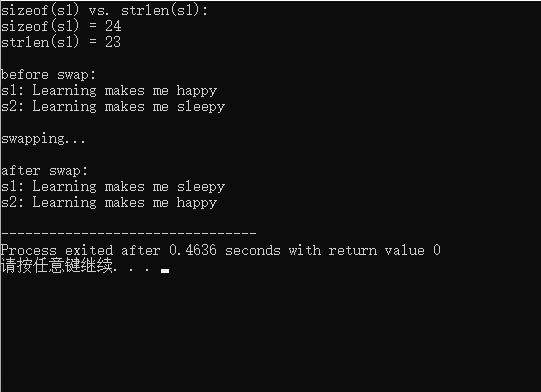
回答问题
1.s1的大小是24个字节,sizeof(s1)计算的是s1的大小,也就是能容纳s1的最小字节数。strlen(s1)统计的是s1的长度。
2.不能,在定义字符数组时,需要指定数组的大小,以便编译器可以为数组分配足够的内存空间。因此,不能在定义字符数组时省略数组大小。并且字符数组不支持直接赋值操作,所以可以借助函数strcpy()来给s1赋值。
3.s1和s2的内容已经完成交换
实验任务2.2
实验代码
#include <stdio.h>
#include <string.h>
#define N 80
int main()
{
char *s1 = "Learning makes me happy";
char *s2 = "Learning makes me sleepy";
char *tmp;
printf("sizeof(s1) vs. strlen(s1): \n");
printf("sizeof(s1) = %d\n", sizeof(s1));
printf("strlen(s1) = %d\n", strlen(s1));
printf("\nbefore swap: \n");
printf("s1: %s\n", s1);
printf("s2: %s\n", s2);
printf("\nswapping...\n");
tmp = s1;
s1 = s2;
s2 = tmp;
printf("\nafter swap: \n");
printf("s1: %s\n", s1);
printf("s2: %s\n", s2);
return 0;
}
实验结论
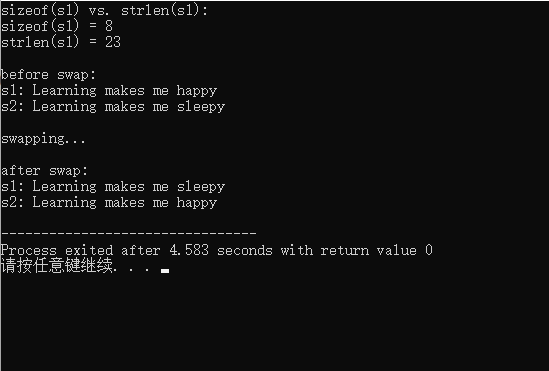
回答问题
问题1:指针变量s1中存放的是字符串常量"Learning makes me happy"的地址。sizeof(s1)计算的是指针变量s1的大小,地址值长度为8个字节。strlen(s1)统计的是字符串常量"Learning makes me happy"的长度。
问题2:可以替换。line7的写法是将字符串常量的地址赋给指针变量s1,而task2_1.c的写法则是将指向字符数组的指针变量s1初始化为对应的字符数组的首地址。二者的语义是一样的。
问题3:line20-line22交换的是指针变量s1和s2的值,即它们所指向的地址值。字符串常量本身在内存中是不可变的,所以它们所对应的存储单元中并没有发生交换。
实验任务3
实验代码
#include <stdio.h>
void str_cpy(char *target, const char *source);
void str_cat(char *str1, char *str2);
int main()
{
char s1[80], s2[20] = "1984";
str_cpy(s1, s2);
puts(s1);
str_cat(s1, " Animal Farm");
puts(s1);
return 0;
}
void str_cpy(char *target, const char *source)
{
while (*target++ = *source++);
}
void str_cat(char *str1, char *str2)
{
while (*str1)
str1++;
while (*str1++ = *str2++);
}
实验结论
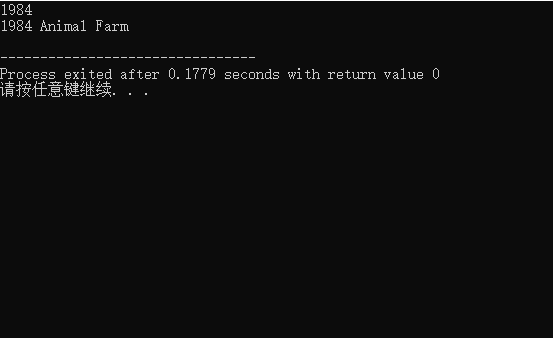
实验任务4
实验代码
#include <stdio.h>
#define N 80
int func(char *);
int main()
{
char str[80];
while (gets(str) != NULL)
{
if (func(str))
printf("yes\n");
else
printf("no\n");
}
return 0;
}
int func(char *str)
{
char *begin, *end;
begin = end = str;
while (*end)
end++;
end--;
while (begin < end)
{
if (*begin != *end)
return 0;
else
{
begin++;
end--;
}
}
return 1;
}
实验结论
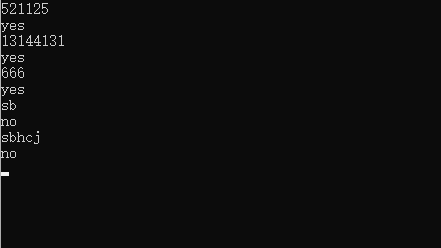
实验任务5
实验代码
#include <stdio.h>
#define N 80
void func(char *);
int main()
{
char s[N];
while (scanf("%s", s) != EOF)
{
func(s);
puts(s);
}
return 0;
}
void func(char *str)
{
int i;
char *p1, *p2, *p;
p1 = str;
while (*p1 == '*')
p1++;
p2 = str;
while (*p2)
p2++;
p2--;
while (*p2 == '*')
p2--;
p = str;
i = 0;
while (p < p1)
{
str[i] = *p;
p++;
i++;
}
while (p <= p2)
{
if (*p != '*')
{
str[i] = *p;
i++;
}
p++;
}
while (*p != '\0')
{
str[i] = *p;
p++;
i++;
}
str[i] = '\0';
}
实验结论
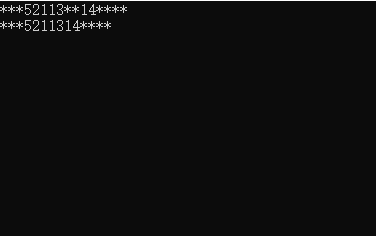
实验任务6.1
实验代码
#include <stdio.h>
#include <string.h>
void sort(char *name[], int n);
int main()
{
char *course[4] = {"C Program",
"C++ Object Oriented Program",
"Operating System",
"Data Structure and Algorithms"};
int i;
sort(course, 4);
for (i = 0; i < 4; i++)
printf("%s\n", course[i]);
return 0;
}
void sort(char *name[], int n)
{
int i, j;
char *tmp;
for (i = 0; i < n - 1; ++i)
for (j = 0; j < n - 1 - i; ++j)
if (strcmp(name[j], name[j + 1]) > 0)
{
tmp = name[j];
name[j] = name[j + 1];
name[j + 1] = tmp;
}
}
实验结论

实验任务6.2
实验代码
#include <stdio.h>
#include <string.h>
void sort(char *name[], int n);
int main()
{
char *course[4] = {"C Program",
"C++ Object Oriented Program",
"Operating System",
"Data Structure and Algorithms"};
int i;
sort(course, 4);
for (i = 0; i < 4; i++)
printf("%s\n", course[i]);
return 0;
}
void sort(char *name[], int n)
{
int i, j, k;
char *tmp;
for (i = 0; i < n - 1; i++)
{
k = i;
for (j = i + 1; j < n; j++)
if (strcmp(name[j], name[k]) < 0)
k = j;
if (k != i)
{
tmp = name[i];
name[i] = name[k];
name[k] = tmp;
}
}
}
实验结论

回答问题
如图示,交换的是指针变量的值。通过交换指针变量的值,可以交换指向字符串的指针,从而改变输出的顺序,而实际存储在内存中的字符串的位置不会改变。
实验任务7
实验代码
#include <stdio.h>
#include <string.h>
#define N 5
int check_id(char *str);
int main()
{
char *pid[N] = {"31010120000721656X",
"330106199609203301",
"53010220051126571",
"510104199211197977",
"53010220051126133Y"};
int i;
for (i = 0; i < N; ++i)
if (check_id(pid[i]))
printf("%s\tTrue\n", pid[i]);
else
printf("%s\tFalse\n", pid[i]);
return 0;
}
int check_id(char *str){
if (strlen(str) != 18)
return 0;
int i;
for (i = 0; i < 18; ++i)
if (!(str[i] >= '0' && str[i] <= '9') && str[i] != 'X')
return 0;
return 1;
}
实验结论

实验任务8
实验代码
#include <stdio.h> 1
#define N 80
void encoder(char *s);
void decoder(char *s);
int main()
{
char words[N];
printf("输入英文文本: ");
gets(words);
printf("编码后的英文文本: ");
encoder(words);
printf("%s\n", words);
printf("对编码后的英文文本解码: ");
decoder(words);
printf("%s\n", words);
return 0;
}
void encoder(char *s)
{
while (*s != '\0') {
if ((*s >= 'a' && *s < 'z') || (*s >= 'A' && *s < 'Z')) {
*s = *s + 1;
} else if (*s == 'z') {
*s = 'a';
} else if (*s == 'Z') {
*s = 'A';
}
s++;
}
}
void decoder(char *s)
{
while (*s != '\0') {
if ((*s > 'a' && *s <= 'z') || (*s > 'A' && *s <= 'Z')) {
*s = *s - 1;
} else if (*s == 'a') {
*s = 'z';
} else if (*s == 'A') {
*s = 'Z';
}
s++;
}
}
实验结论
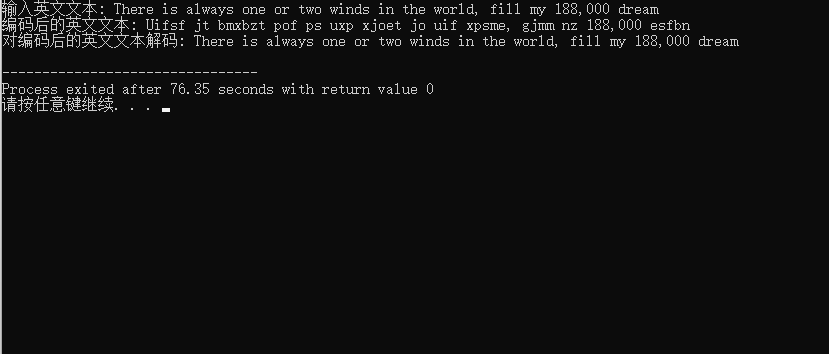



 浙公网安备 33010602011771号
浙公网安备 33010602011771号